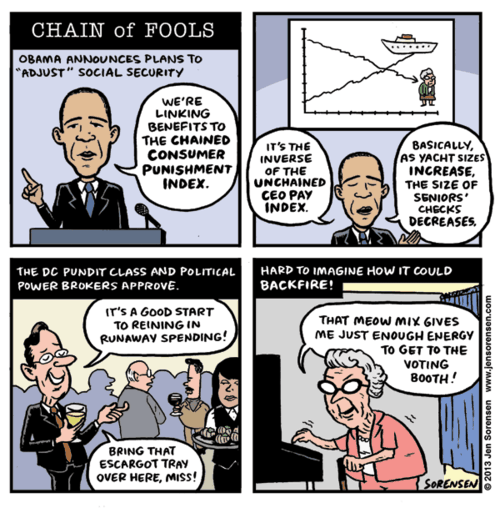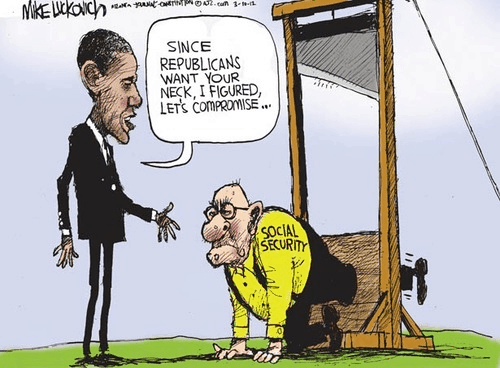In Washington, Flight Delays = “Crisis”; Meals on Wheels Cuts = “Oh, well”
 A new Rasmussen poll highlights the absurdity of Congress’ decision to swoop in and prove they can “work together” – at least when it’s in their own best interests – by lifting the sequester’s impact on the FAA.
A new Rasmussen poll highlights the absurdity of Congress’ decision to swoop in and prove they can “work together” – at least when it’s in their own best interests – by lifting the sequester’s impact on the FAA.
“Congress cited public outrage as the reason for moving swiftly to end flight delays caused by the sequester. However, very few Americans were actually impacted.”
In fact, only 16% of Americans even know anyone impacted. Commentator Richard Eskow was among that tiny minority. He offers these thoughts:
“At no point during my mini-“ordeal” did I think “Boy, I’d be happy to cut my Social Security and everybody else’s too so this won’t happen again.” The thought never even crossed my mind.
So I was disappointed when the President used his weekly national address to push, not for a total repeal of the sequester, but for his “compromise” austerity budget – a budget which includes unnecessary cuts to Social Security. The title of his address – “Time to Replace the Sequester with a Balanced Approach to Deficit Reduction” – betrays a continued unawareness of either the pain caused by these unwise cuts or the shifting economic reality which has discredited Washington’s deficit mania.
The only sensible thing to do is to cancel the entire sequester. And stop trying to use it to gin up hysteria so they can put through other unpopular cuts. Just can it.”
As a reminder, here are just some of the real cuts Americans face because of this sequester:
-
Thousands of cancer patients are being turned away from cancer clinics for chemotherapy treatments due to Medicare cuts
-
140,000 low-income families – mostly disabled elders and families with children – are losing rental assistance vouchers
- 70,000 children are being kicked out of Head Start programs
- The Caregiver support program will be cut by $12.6 million
- The Meals on Wheels program will be cut by 17 million meals
“Michele Daley, director of nutrition services at the Local Office on Aging, which serves Roanoke, Alleghany, Botetourt and Craig counties in Virginia, said the agency expects to receive $95,000 less in federal funds this year (it has an operating budget of $1 million). They’re gradually reducing the number of people receiving daily meals from 650 to 600 as a result of the budget cuts. Already, the office has planned to stop handing out most emergency meals — bags of shelf-stable items like canned beans distributed in advance of snowstorms and holidays. And they’ve instituted a waiting list. “We’ve never had a waiting list,” Daley said. “This is the first time ever and it’s a direct result of sequestration.” Huffington Post
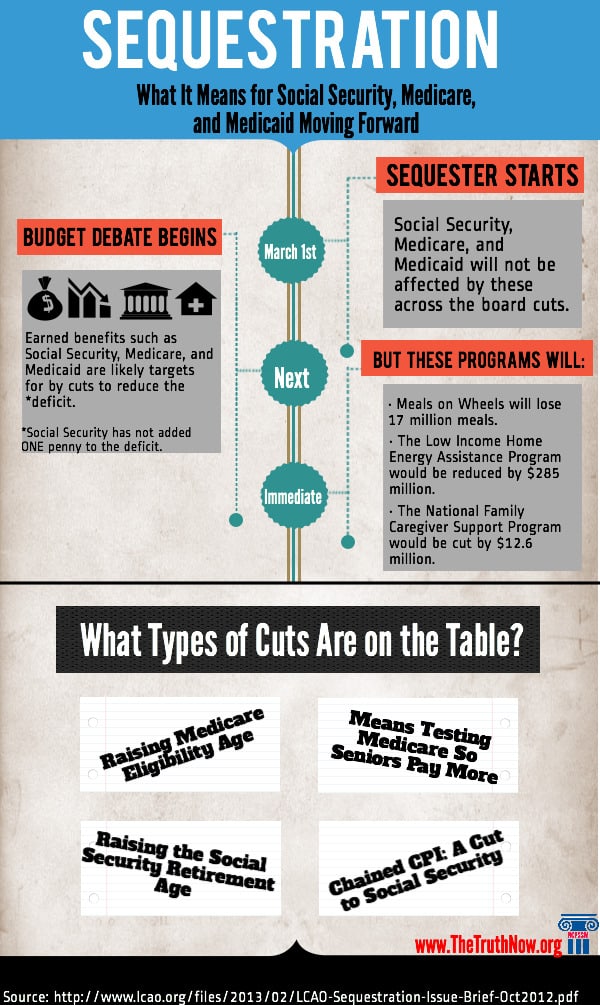


Time Goes By blogger, Ronni Bennett expressed the frustration so many feel (outside the Beltway anyway),
“Judging from past performance and publicly professed ideology, I would have thought there are several senators who coulda/woulda/shoulda stopped this legislation: Bernie Sanders (I-Vermont), Elizabeth Warren (D-MA), maybe even my two Oregon senators, Democrats Ron Wyden and Jeff Merkley.
But no. Not one senator (nor even the president) took a principled stand for needy elders, children and their families not to mention Medicare cancer patients denied chemotherapy drugs, some of whom will die as a result. (Yes, they will.)
But never mind. Congress members and rich people will not be caused “unnecessary harm,” (as White House Spokesman Carney so helpfully explained) by airport delays. This is the country we live in now. “
Rather than end on such a down note, we thought you’d also enjoy comedian Jon Stewart‘s take on the whole ridiculous situation and Mike Thompson’s editorial cartoon to help soften the edges of your outrage:
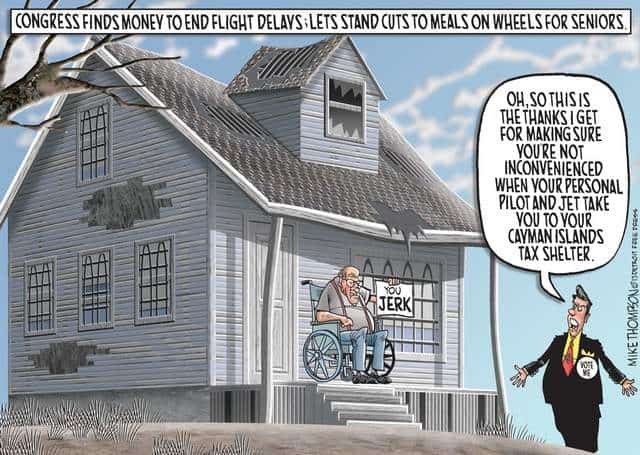


Immigration Reform Is Not a Threat to Social Security



“Those opposed to immigration reform have attempted to use vital programs, like Social Security, as an economic excuse to avoid doing the right thing. The truth is, comprehensive immigration reform is not a threat to Social Security. In fact, earlier immigration reform proposals moderately strengthened Social Security’s financing, and the legislation under consideration today should do the same. By bringing undocumented workers out of the shadows of our economy and into its mainstream, immigration reform has the potential to strengthen Social Security and accelerate overall economic growth.” …Max Richtman, NCPSSM President/CEO
The National Council on Aging and the National Hispanic Council on Aging have also examined immigration reform’s impact on vital programs in their policy brief, “Immigration Reform: Key Issues for Older Adults and People with Disabilities.”
“Comprehensive immigration reform will help millions come out of the shadows. Many of the half million older adult immigrants have worked for decades and contributed millions to Social Security. They should be able to receive the payments they’ve earned. Hispanic seniors, immigrant or not, struggle to reach economic security and without Social Security 50% would live in poverty. Social Security is particularly important to them and instead of denying earned Social Security benefits to new Americans, we should reward their contributions to the United States.” …Jason Coates, NHCOA Public Policy Associate
The NCOA/NHCOA joint study highlighted several important findings, including: immigration reform will increase the number of workers contributing taxes adding additional federal and state revenue, the future ratio of workers to beneficiaries for Social Security and Medicare will be enhanced by the addition of children and grandchildren of immigrants, and the strengthening of a stable direct care work force will assist individuals with disabilities, older adults, and informal family caregivers and also allow newly legalized workers to contribute economically. U.S. businesses lose up to an estimated $33.6 billion per year in lost productivity from full time working informal family caregivers.
“Immigration reform is the right thing to do and the smart thing to do. The practical matter is the number of older people who will need long-term care as they age will double in the coming decade. One in five of our current direct care workforce was born abroad. An estimated 27 million seniors will need long term help by 2050 and the need for direct care workers will grow dramatically, an estimated 1.6 million workers by 2020 and 3 million workers by 2050. Finding a way to provide a stable and steady workforce is crucial.”… James Firman, NCOA President/CEO
Here are some highlights from our report that opponents of immigration reform will never tell you:
- Stephen C. Goss, the chief actuary of the Social Security Administration, has reported that unauthorized immigrants contributed about $15 billion a year to Social Security, adding an estimated $300 billion over the years to the Social Security trust fund. During the most recent attempt to reform our immigration system in 2007, the Congressional Budget Office (CBO) estimated granting permanent status would generate $57 billion in additional revenue over a decade,
- As legal status is granted to current undocumented immigrants, allowing workers to step out of the shadows, contributions to the Social Security program will increase. The CBO estimated that reform would increase the growth of the economy by as much as 1.3 percent.
- Social Security trustees project that an increase in immigration of 100,000 persons a year would improve the long-term actuarial balance of the Social Security’s trust fund by about 3.5% of the projected 75-year deficit.
- The immigrant population, in particular undocumented workers, is very young. In fact 59% are between 25 and 44 years of age. History has shown that their children, as legal second- generation Americans, would make measureable contributions to our nation and economy. A Pew research study of the 20 million adult U.S.-born children of immigrants shows that these adult children have median incomes and homeownership rates similar to the general U.S. population. In fact, second generation adult children of immigrants have a lower poverty rate and higher college graduation rates. All of these demographic factors are potentially good – not bad – news for Social Security.
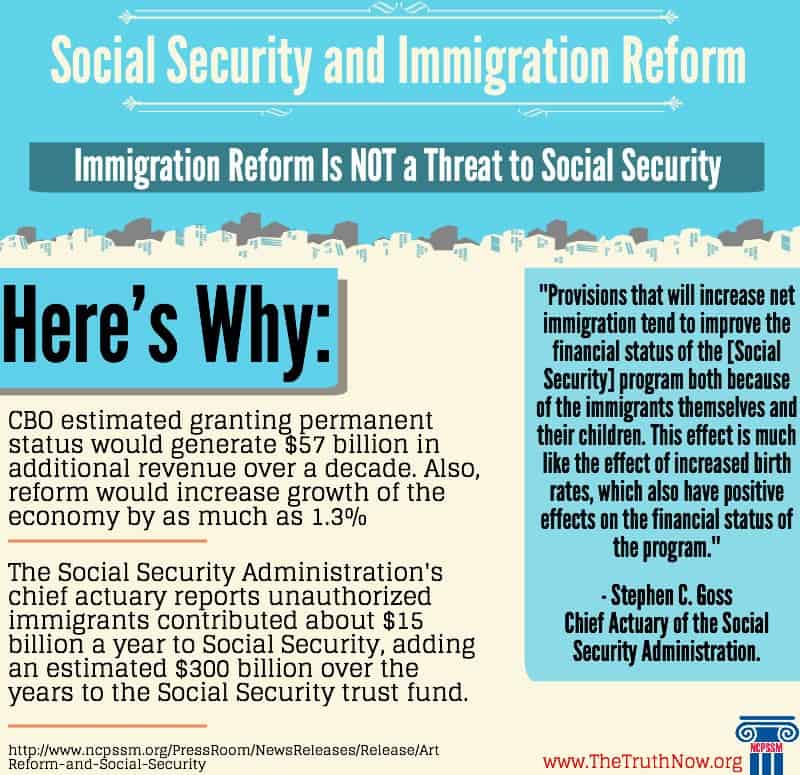


$2.1 Billion Quarterly Profits Still Not Enough – Private Insurers Want Washington to Give Them Even More



Kaiser Health News explains how United Health’s CEO claims the company’s $2.1 billion profits last quarter just aren’t enough. They want taxpayers to pony up even more to subsidize their participation in Medicare.
KAISER HEALTH NEWS
Despite Win, UnitedHealth Criticizes Medicare Rates, Eyes Pruning Business
If the Obama administration expected the biggest health insurance company to give thanks for this month’s decision to reverse cuts to private Medicare plans, it was wrong. UnitedHealth Group CEO Stephen Hemsley said Thursday that Medicare Advantage rates are still far too low and that the company may shrink its business of managing care for seniors.
“We did not expect the fastest growing, most popular and most effective Medicare benefit option serving America’s seniors to be underfunded to this extent in 2014,” Hemsley said on a conference call with investment analysts. UnitedHealth’s Medicare Advantage business, he added, “will likely experience market exits as well as in market membership contraction as we reshape Medicare networks and benefits to respond to the continuing underfunding of this program.”
The administration’s decision to reverse cuts for Medicare Advantage, in which private insurers operate managed care networks for seniors, was seen as a significant industry victory. As the biggest seller of Medicare Advantage plans, UnitedHealth was deemed a primary beneficiary. More than one Medicare member in four is in a Medicare Advantage plan.
In February the Department of Health and Human Services surprised insurers by announcing a cut of more than 2 percent per Medicare member for 2014. The industry launched a lobbying and advertising campaign in protest. On April 1, the administration pulled back, announcing that instead of reducing payments it would raise them by 3.3 percent. UnitedHealth’s stock stock rose 8 percent that day and the next.
But in Thursday’s call to discuss the company’s quarterly profits of $2.1 billion on revenue of $30.3 billion, Hemsley said other changes — including the Affordable Care Act’s long-term reduction in Medicare Advantage payments – would still lead to a net reduction next year of more than 4 percent. That’s inadequate when medical costs are rising in the 3 percent neighborhood, he said.
President’s Social Security Plan Reneges on Promise to Middle Class Americans



“Federal budgets are far more than just numbers on a page. They represent national priorities for our fiscal future. That’s why so many middle-class Americans are stunned to see President Obama’s budget priorities include cutting benefits to millions of seniors, retired veterans and people with disabilities. This budget also includes more means testing for seniors in Medicare and less than half the new revenue requested in earlier budget negotiations. The President’s budget is not the balanced plan promised to Americans before November’s election.
Changing the current cost of living allowance formula to a stingier and less accurate Chained CPI is an immediate benefit cut for millions living on already modest incomes. The White House knows this formula is not more accurate for seniors, which is why it’s promised exemptions and bumps to try and soften the blow for some. But it still leaves millions of seniors facing benefit cuts, breaking the promise President Obama made to protect America’s middle class families.
Clearly it will be up to members of Congress to set fiscal priorities that actually represent the needs of the average citizens they were elected to represent. The vast majority of Americans, of all political parties, oppose cutting Social Security and Medicare to reduce the deficit. It’s more than just wishful thinking if Congress believes voters will reward them for cutting Social Security to pay for a deficit it did not create.”…Max Richtman, NCPSSM President/CEO
There are many, many places you can go today if you want to try and figure out what in the world possessed a Democratic President to propose Social Security cuts that even the Republicans avoided their own budget. Here are a couple worthwhile political pieces:
“…without a bipartisan budget deal that backs these cuts, it’s possible Republicans just got an even bigger gift: that chained CPI becomes an idea associated with Democrats alone. That ought to play well in 2014. Of course, the Senate unanimously approved Sen. Bernie Sanders’ resolution opposing a switch to the chained CPI by voice vote, showing no senator in either party wants his or her name on the proposal. For now, publicly at least, Obama stands alone.” Salon
“The liberals’ objections are legitimate — particularly their resistance to a stingier inflation formula for Social Security, which isn’t as big a budget problem as Medicare. There’s a case to be made that the president shouldn’t negotiate with himself by opening the bidding with his final offer. There’s also a concern that he now “owns” Social Security cuts, and Republicans can use that against him.” Washington Post
On the policy side, there is also some good coverage of just how flawed this plan truly is for middle-class Americans and the massive across-party opposition:
“There are a number of problems with this proposal, including the fact that the real cost of living for the elderly probably increases faster than the CPI-W, since the elderly consume a disproportionate amount of health care, which has a higher inflation rate than the overall economy. More generally, you don’t actually save any money by reducing Social Security checks. There’s no “waste” in Social Security. It’s a program in which one set of people pays cash to the government and the government pays virtually all of that cash back out to another set of people. Every dollar in lower benefits is one dollar less in someone’s wallet.” The Atlantic
“The AARP reveals that 70 percent of voters age 50-plus oppose the use of the chained CPI to cut benefits, and two-thirds of them – including 60 percent of Republicans — say they would be “considerably less likely” to support a congressional candidate if he or she backed a new way of calculating consumer prices. And 84 percent of voters over 50 say Social Security has no place in budget-deficit discussions, since it is self-financed. On every single question, Republicans lag only a point or two behind Democrats in their opposition to Social Security cuts.” AARP
Just in case you haven’t pulled your hair out completely yet, we also recommend you check out the White House’s fact sheet for seniors, which incredibly claims this budget will strengthen Social Security while failing to provide even a single mention of Social Security benefit cuts which start at $130 the first year for the average 65 year-old retiree. The cumulative cut for that individual would be $4,631 or more than three months of benefits by age 75; $13,910 or nearly a year of benefits by age 85; and $28,004, more than a year and a half of benefits by age 95.
Seems like that might have been worth a mention by the White House today.
Lastly, a little twisted humor making the rounds on Tumblr:
2.3 Million Americans tell the White House – NO to Chained CPI



“Contrary to the political spin, America’s seniors know this chained CPI proposal isn’t a ‘tweak’ or an ‘adjustment.’ It’s not more accurate for seniors but it is designed to cut benefits and raise taxes, largely on the poor and middle class. Any politician in Washington who thinks they can slip these benefit cuts by millions of seniors, veterans, people with disabilities and their families unnoticed is in for the shock of their careers.”… Max Richtman, NCPSSM President/CEO
National Committee volunteer Antoinette Bobo, a 74 year old retiree from Washington, D.C., also spoke out against the proposed cut at today’s event:
“President Obama needs to rethink his Chained CPI proposal because most seniors have no other way to survive except for Social Security and Medicare. And it’s not just about us, it’s about our children and grandchildren who are going to need the same protections that we have. We earned these benefits and we’re counting on them for the future.”
A group of Democratic members of Congress committed to protecting Social Security, including Senator Bernie Sanders (I-VT), told today’s White House protestors that President Obama is simply wrong to propose cutting already modest benefits to seniors, retired veterans and people with disabilities.
“We are not going to balance the budget on the backs of the elderly, disabled vets, the sick, women or children. When one out of four major profitable corporations pay nothing in federal income taxes we know how we can deal with deficit reduction in a way that is fair. The White House tells us they want to defend the middle class. Well if you really want to defend the middle class you don’t cut Social Security, and you don’t cut Medicare and you don’t cut benefits.”… Senator Bernie Sanders (I-VT)
Participants in today’s event included: The National Committee to Preserve Social Security and Medicare, Social Security Works, AFL-CIO, National Organization for Women, Campaign for America’s Future, Progressive Change Campaign Committee, Democracy for America, MoveOn and former Obama for America supporters and seniors who rely on Social Security.
Today’s White House protest marks just the beginning of a mobilization of Americans nationwide. Tomorrow, Americans will follow up today’s petition delivery with a Congressional Call-In day telling members to oppose the chained CPI.
When the President’s budget comes out tomorrow it’s critical that we send an early shot across Congress’ bow. Let them know:
Keep the Promise. Social Security doesn’t contribute to the deficit and Americans of all parties oppose cutting benefits earned by middle-class families. The Chained CPI isn’t a “tweak” it’s a benefit cut America’s retirees, veterans and the disabled simply cannot afford.
Congressional Call in Day
Wednesday, April 10th
(800) 998-0180
In Washington, Flight Delays = “Crisis”; Meals on Wheels Cuts = “Oh, well”



“Congress cited public outrage as the reason for moving swiftly to end flight delays caused by the sequester. However, very few Americans were actually impacted.”
In fact, only 16% of Americans even know anyone impacted. Commentator Richard Eskow was among that tiny minority. He offers these thoughts:
“At no point during my mini-“ordeal” did I think “Boy, I’d be happy to cut my Social Security and everybody else’s too so this won’t happen again.” The thought never even crossed my mind.
So I was disappointed when the President used his weekly national address to push, not for a total repeal of the sequester, but for his “compromise” austerity budget – a budget which includes unnecessary cuts to Social Security. The title of his address – “Time to Replace the Sequester with a Balanced Approach to Deficit Reduction” – betrays a continued unawareness of either the pain caused by these unwise cuts or the shifting economic reality which has discredited Washington’s deficit mania.
The only sensible thing to do is to cancel the entire sequester. And stop trying to use it to gin up hysteria so they can put through other unpopular cuts. Just can it.”
As a reminder, here are just some of the real cuts Americans face because of this sequester:
-
Thousands of cancer patients are being turned away from cancer clinics for chemotherapy treatments due to Medicare cuts
-
140,000 low-income families – mostly disabled elders and families with children – are losing rental assistance vouchers
- 70,000 children are being kicked out of Head Start programs
- The Caregiver support program will be cut by $12.6 million
- The Meals on Wheels program will be cut by 17 million meals
“Michele Daley, director of nutrition services at the Local Office on Aging, which serves Roanoke, Alleghany, Botetourt and Craig counties in Virginia, said the agency expects to receive $95,000 less in federal funds this year (it has an operating budget of $1 million). They’re gradually reducing the number of people receiving daily meals from 650 to 600 as a result of the budget cuts. Already, the office has planned to stop handing out most emergency meals — bags of shelf-stable items like canned beans distributed in advance of snowstorms and holidays. And they’ve instituted a waiting list. “We’ve never had a waiting list,” Daley said. “This is the first time ever and it’s a direct result of sequestration.” Huffington Post



Time Goes By blogger, Ronni Bennett expressed the frustration so many feel (outside the Beltway anyway),
“Judging from past performance and publicly professed ideology, I would have thought there are several senators who coulda/woulda/shoulda stopped this legislation: Bernie Sanders (I-Vermont), Elizabeth Warren (D-MA), maybe even my two Oregon senators, Democrats Ron Wyden and Jeff Merkley.
But no. Not one senator (nor even the president) took a principled stand for needy elders, children and their families not to mention Medicare cancer patients denied chemotherapy drugs, some of whom will die as a result. (Yes, they will.)
But never mind. Congress members and rich people will not be caused “unnecessary harm,” (as White House Spokesman Carney so helpfully explained) by airport delays. This is the country we live in now. “
Rather than end on such a down note, we thought you’d also enjoy comedian Jon Stewart‘s take on the whole ridiculous situation and Mike Thompson’s editorial cartoon to help soften the edges of your outrage:



Immigration Reform Is Not a Threat to Social Security



“Those opposed to immigration reform have attempted to use vital programs, like Social Security, as an economic excuse to avoid doing the right thing. The truth is, comprehensive immigration reform is not a threat to Social Security. In fact, earlier immigration reform proposals moderately strengthened Social Security’s financing, and the legislation under consideration today should do the same. By bringing undocumented workers out of the shadows of our economy and into its mainstream, immigration reform has the potential to strengthen Social Security and accelerate overall economic growth.” …Max Richtman, NCPSSM President/CEO
The National Council on Aging and the National Hispanic Council on Aging have also examined immigration reform’s impact on vital programs in their policy brief, “Immigration Reform: Key Issues for Older Adults and People with Disabilities.”
“Comprehensive immigration reform will help millions come out of the shadows. Many of the half million older adult immigrants have worked for decades and contributed millions to Social Security. They should be able to receive the payments they’ve earned. Hispanic seniors, immigrant or not, struggle to reach economic security and without Social Security 50% would live in poverty. Social Security is particularly important to them and instead of denying earned Social Security benefits to new Americans, we should reward their contributions to the United States.” …Jason Coates, NHCOA Public Policy Associate
The NCOA/NHCOA joint study highlighted several important findings, including: immigration reform will increase the number of workers contributing taxes adding additional federal and state revenue, the future ratio of workers to beneficiaries for Social Security and Medicare will be enhanced by the addition of children and grandchildren of immigrants, and the strengthening of a stable direct care work force will assist individuals with disabilities, older adults, and informal family caregivers and also allow newly legalized workers to contribute economically. U.S. businesses lose up to an estimated $33.6 billion per year in lost productivity from full time working informal family caregivers.
“Immigration reform is the right thing to do and the smart thing to do. The practical matter is the number of older people who will need long-term care as they age will double in the coming decade. One in five of our current direct care workforce was born abroad. An estimated 27 million seniors will need long term help by 2050 and the need for direct care workers will grow dramatically, an estimated 1.6 million workers by 2020 and 3 million workers by 2050. Finding a way to provide a stable and steady workforce is crucial.”… James Firman, NCOA President/CEO
Here are some highlights from our report that opponents of immigration reform will never tell you:
- Stephen C. Goss, the chief actuary of the Social Security Administration, has reported that unauthorized immigrants contributed about $15 billion a year to Social Security, adding an estimated $300 billion over the years to the Social Security trust fund. During the most recent attempt to reform our immigration system in 2007, the Congressional Budget Office (CBO) estimated granting permanent status would generate $57 billion in additional revenue over a decade,
- As legal status is granted to current undocumented immigrants, allowing workers to step out of the shadows, contributions to the Social Security program will increase. The CBO estimated that reform would increase the growth of the economy by as much as 1.3 percent.
- Social Security trustees project that an increase in immigration of 100,000 persons a year would improve the long-term actuarial balance of the Social Security’s trust fund by about 3.5% of the projected 75-year deficit.
- The immigrant population, in particular undocumented workers, is very young. In fact 59% are between 25 and 44 years of age. History has shown that their children, as legal second- generation Americans, would make measureable contributions to our nation and economy. A Pew research study of the 20 million adult U.S.-born children of immigrants shows that these adult children have median incomes and homeownership rates similar to the general U.S. population. In fact, second generation adult children of immigrants have a lower poverty rate and higher college graduation rates. All of these demographic factors are potentially good – not bad – news for Social Security.



$2.1 Billion Quarterly Profits Still Not Enough – Private Insurers Want Washington to Give Them Even More



Kaiser Health News explains how United Health’s CEO claims the company’s $2.1 billion profits last quarter just aren’t enough. They want taxpayers to pony up even more to subsidize their participation in Medicare.
KAISER HEALTH NEWS
Despite Win, UnitedHealth Criticizes Medicare Rates, Eyes Pruning Business
If the Obama administration expected the biggest health insurance company to give thanks for this month’s decision to reverse cuts to private Medicare plans, it was wrong. UnitedHealth Group CEO Stephen Hemsley said Thursday that Medicare Advantage rates are still far too low and that the company may shrink its business of managing care for seniors.
“We did not expect the fastest growing, most popular and most effective Medicare benefit option serving America’s seniors to be underfunded to this extent in 2014,” Hemsley said on a conference call with investment analysts. UnitedHealth’s Medicare Advantage business, he added, “will likely experience market exits as well as in market membership contraction as we reshape Medicare networks and benefits to respond to the continuing underfunding of this program.”
The administration’s decision to reverse cuts for Medicare Advantage, in which private insurers operate managed care networks for seniors, was seen as a significant industry victory. As the biggest seller of Medicare Advantage plans, UnitedHealth was deemed a primary beneficiary. More than one Medicare member in four is in a Medicare Advantage plan.
In February the Department of Health and Human Services surprised insurers by announcing a cut of more than 2 percent per Medicare member for 2014. The industry launched a lobbying and advertising campaign in protest. On April 1, the administration pulled back, announcing that instead of reducing payments it would raise them by 3.3 percent. UnitedHealth’s stock stock rose 8 percent that day and the next.
But in Thursday’s call to discuss the company’s quarterly profits of $2.1 billion on revenue of $30.3 billion, Hemsley said other changes — including the Affordable Care Act’s long-term reduction in Medicare Advantage payments – would still lead to a net reduction next year of more than 4 percent. That’s inadequate when medical costs are rising in the 3 percent neighborhood, he said.
President’s Social Security Plan Reneges on Promise to Middle Class Americans



“Federal budgets are far more than just numbers on a page. They represent national priorities for our fiscal future. That’s why so many middle-class Americans are stunned to see President Obama’s budget priorities include cutting benefits to millions of seniors, retired veterans and people with disabilities. This budget also includes more means testing for seniors in Medicare and less than half the new revenue requested in earlier budget negotiations. The President’s budget is not the balanced plan promised to Americans before November’s election.
Changing the current cost of living allowance formula to a stingier and less accurate Chained CPI is an immediate benefit cut for millions living on already modest incomes. The White House knows this formula is not more accurate for seniors, which is why it’s promised exemptions and bumps to try and soften the blow for some. But it still leaves millions of seniors facing benefit cuts, breaking the promise President Obama made to protect America’s middle class families.
Clearly it will be up to members of Congress to set fiscal priorities that actually represent the needs of the average citizens they were elected to represent. The vast majority of Americans, of all political parties, oppose cutting Social Security and Medicare to reduce the deficit. It’s more than just wishful thinking if Congress believes voters will reward them for cutting Social Security to pay for a deficit it did not create.”…Max Richtman, NCPSSM President/CEO
There are many, many places you can go today if you want to try and figure out what in the world possessed a Democratic President to propose Social Security cuts that even the Republicans avoided their own budget. Here are a couple worthwhile political pieces:
“…without a bipartisan budget deal that backs these cuts, it’s possible Republicans just got an even bigger gift: that chained CPI becomes an idea associated with Democrats alone. That ought to play well in 2014. Of course, the Senate unanimously approved Sen. Bernie Sanders’ resolution opposing a switch to the chained CPI by voice vote, showing no senator in either party wants his or her name on the proposal. For now, publicly at least, Obama stands alone.” Salon
“The liberals’ objections are legitimate — particularly their resistance to a stingier inflation formula for Social Security, which isn’t as big a budget problem as Medicare. There’s a case to be made that the president shouldn’t negotiate with himself by opening the bidding with his final offer. There’s also a concern that he now “owns” Social Security cuts, and Republicans can use that against him.” Washington Post
On the policy side, there is also some good coverage of just how flawed this plan truly is for middle-class Americans and the massive across-party opposition:
“There are a number of problems with this proposal, including the fact that the real cost of living for the elderly probably increases faster than the CPI-W, since the elderly consume a disproportionate amount of health care, which has a higher inflation rate than the overall economy. More generally, you don’t actually save any money by reducing Social Security checks. There’s no “waste” in Social Security. It’s a program in which one set of people pays cash to the government and the government pays virtually all of that cash back out to another set of people. Every dollar in lower benefits is one dollar less in someone’s wallet.” The Atlantic
“The AARP reveals that 70 percent of voters age 50-plus oppose the use of the chained CPI to cut benefits, and two-thirds of them – including 60 percent of Republicans — say they would be “considerably less likely” to support a congressional candidate if he or she backed a new way of calculating consumer prices. And 84 percent of voters over 50 say Social Security has no place in budget-deficit discussions, since it is self-financed. On every single question, Republicans lag only a point or two behind Democrats in their opposition to Social Security cuts.” AARP
Just in case you haven’t pulled your hair out completely yet, we also recommend you check out the White House’s fact sheet for seniors, which incredibly claims this budget will strengthen Social Security while failing to provide even a single mention of Social Security benefit cuts which start at $130 the first year for the average 65 year-old retiree. The cumulative cut for that individual would be $4,631 or more than three months of benefits by age 75; $13,910 or nearly a year of benefits by age 85; and $28,004, more than a year and a half of benefits by age 95.
Seems like that might have been worth a mention by the White House today.
Lastly, a little twisted humor making the rounds on Tumblr:
2.3 Million Americans tell the White House – NO to Chained CPI



“Contrary to the political spin, America’s seniors know this chained CPI proposal isn’t a ‘tweak’ or an ‘adjustment.’ It’s not more accurate for seniors but it is designed to cut benefits and raise taxes, largely on the poor and middle class. Any politician in Washington who thinks they can slip these benefit cuts by millions of seniors, veterans, people with disabilities and their families unnoticed is in for the shock of their careers.”… Max Richtman, NCPSSM President/CEO
National Committee volunteer Antoinette Bobo, a 74 year old retiree from Washington, D.C., also spoke out against the proposed cut at today’s event:
“President Obama needs to rethink his Chained CPI proposal because most seniors have no other way to survive except for Social Security and Medicare. And it’s not just about us, it’s about our children and grandchildren who are going to need the same protections that we have. We earned these benefits and we’re counting on them for the future.”
A group of Democratic members of Congress committed to protecting Social Security, including Senator Bernie Sanders (I-VT), told today’s White House protestors that President Obama is simply wrong to propose cutting already modest benefits to seniors, retired veterans and people with disabilities.
“We are not going to balance the budget on the backs of the elderly, disabled vets, the sick, women or children. When one out of four major profitable corporations pay nothing in federal income taxes we know how we can deal with deficit reduction in a way that is fair. The White House tells us they want to defend the middle class. Well if you really want to defend the middle class you don’t cut Social Security, and you don’t cut Medicare and you don’t cut benefits.”… Senator Bernie Sanders (I-VT)
Participants in today’s event included: The National Committee to Preserve Social Security and Medicare, Social Security Works, AFL-CIO, National Organization for Women, Campaign for America’s Future, Progressive Change Campaign Committee, Democracy for America, MoveOn and former Obama for America supporters and seniors who rely on Social Security.
Today’s White House protest marks just the beginning of a mobilization of Americans nationwide. Tomorrow, Americans will follow up today’s petition delivery with a Congressional Call-In day telling members to oppose the chained CPI.
When the President’s budget comes out tomorrow it’s critical that we send an early shot across Congress’ bow. Let them know:
Keep the Promise. Social Security doesn’t contribute to the deficit and Americans of all parties oppose cutting benefits earned by middle-class families. The Chained CPI isn’t a “tweak” it’s a benefit cut America’s retirees, veterans and the disabled simply cannot afford.
Congressional Call in Day
Wednesday, April 10th
(800) 998-0180



